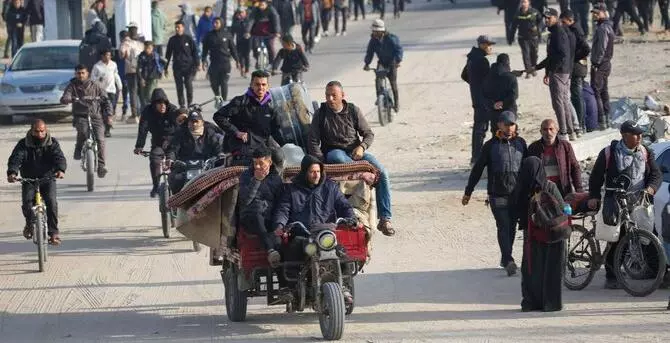
After delay over hostage list, Israel-Hamas truce in Gaza begins
text_fieldsPhoto: AFP
Jerusalem: Following a last-minute delay on Prime Minister Benjamin Netanyahu's orders, Israel announced Sunday that a truce with Hamas had begun in Gaza at 0915 GMT, over three hours later than originally planned.
According to Gaza's civil defence agency, eight people were killed by Israeli attacks during the delay.
Less than an hour before the truce was scheduled to begin at 8:30 am (0630 GMT), Netanyahu's office released a statement claiming that he had "instructed the IDF (military) that the ceasefire... will not begin until Israel has received the list" of captives to be released.
Shortly after verifying that it had received the list and was "checking the details," Israel announced that the truce would start at 11:15 a.m. local time.
About 30 minutes before the truce was supposed to go into effect, and again 30 minutes later, AFPTV live footage from northeastern Gaza showed a column of grey smoke.
The Israeli military affirmed that, per Netanyahu's order, it was continuing to "strike within the Gaza area."
Mahmud Bassal, a spokesman for Gaza's civil defence, reported that three people were killed in the territory's north and five in Gaza City, while 25 others were injured.
However, with this delay, people saw their plans to return home thwarted, AFP reported.
“I was on my way home with my family when we heard the sound of bombing,” said Mohammed Baraka, 36.
“We can’t reach our house; the situation is dangerous. I don’t know what to do. I feel frustrated and devastated.”
Three Israeli hostages were to be freed from captivity in exchange for the first group of Palestinian prisoners in the original agreement.
During the first 42-day truce, 33 hostages who were captured by militants during Hamas' October 7, 2023 attack on Israel would be returned from Gaza. The agreement calls for the release of hundreds of Palestinian inmates from Israeli prisons.
The aim of the truce is to bring an end to the more than 15 months of fighting that began with the deadliest attack by Hamas in Israeli history.
It follows a deal reached by mediators Qatar, the United States, and Egypt after months of discussions, and it goes into effect on the eve of Donald Trump's inauguration as US president.
In a televised address on Saturday, Netanyahu referred to the 42-day first phase as a "temporary ceasefire" and stated that Israel has US support to return to war if required.
People in Gaza City were already rejoicing, waving Palestinian flags in the street, shortly after the deal was supposed to take effect. However, once it became evident that conflicts would continue, some people's joy turned to desperation.
“I’m dying of despair,” said a 27-year-old displaced Maha Abed from Rafah who had been waiting for her husband since dawn to pick her up and take her home. “He called to tell me we won’t be returning today. The drones are firing at civilians.”
“Enough playing with our emotions — we’re exhausted,” she added. “I don’t want to spend another night in this tent.”
The Israeli army advised Gaza residents early Sunday not to approach its troops or Israeli territory
“We urge you not to head toward the buffer zone or IDF forces for your safety,” military spokesman Avichay Adraee said on Telegram.
“At this stage, heading toward the buffer zone or moving from south to north via Gaza Valley puts you at risk.”
Israel's justice ministry had previously stated that 737 Palestinian prisoners and detainees will be released under the deal's first phase, which begins at 4:00 p.m. (1400 GMT) on Sunday.
Egypt said on Saturday that more than 1,890 Palestinian prisoners would be released in the first phase. Hundreds of trucks waited at the Gaza border, ready to enter from Egypt as soon as they received the go-ahead to deliver much-needed aid.





